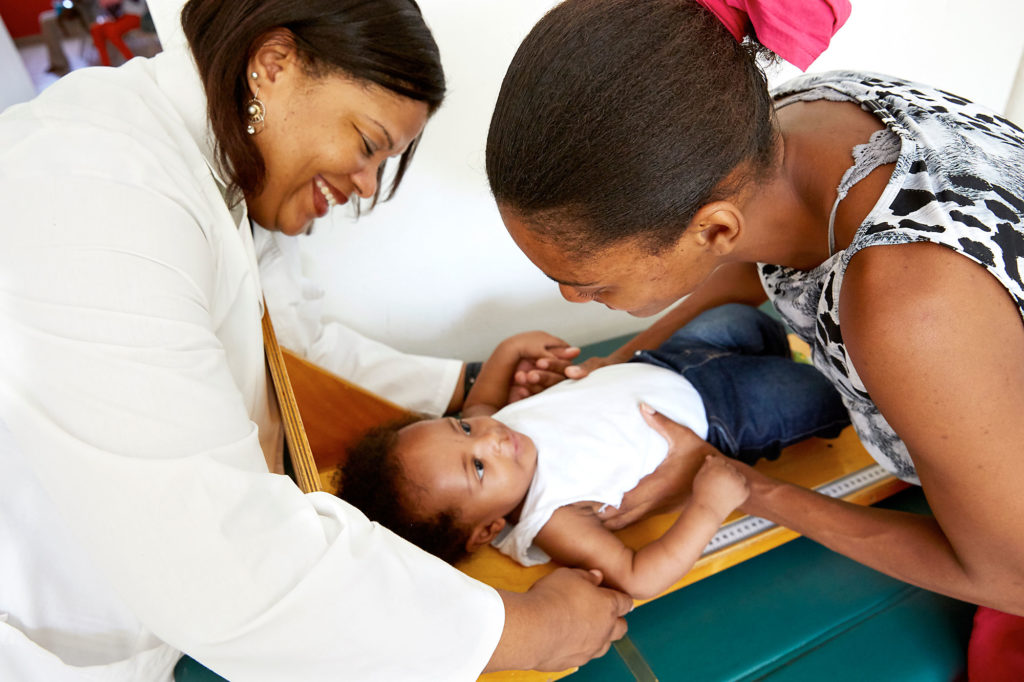Working for an HIV-free generation
Haiti has made tremendous progress in recent years in its efforts against HIV and AIDS, reducing new infections, lowering AIDS-related deaths and increasing access to treatment. Yet, the small island nation still has a long way to go to be HIV free. Some 55 percent of all HIV-positive people in the Caribbean live in Haiti.
Women and girls disproportionately affected
As in many places, women and girls are disproportionately affected due to stigma and cultural practices. Young women in Haiti are 3 times more likely to be HIV-positive than young men. One of the champions leading the charge for an AIDS-free generation in Haiti is Dr. Jenny Edouard and her dedicated team at NPH St. Damien Hospital.

Care for over 4,000 children annually
Dr. Jenny Edouard has been fighting for an HIV-free Haiti since she graduated from medical school in Port-au-Prince in 2006. She now coordinates a public health and HIV programme at St. Damien, a 224-bed paediatric hospital that provides around 56,000 medical services annually to children and their families. Dr. Edouard supervises a community health and HIV programme that provides care to over 4,000 children annually with a particular focus on the elimination of mother to child transmission (EMTCT) of HIV.
“We’ve made huge strides towards eliminating mother to child transmission of HIV. Our EMTCT programmes have been impactful, practical and effective in reducing HIV transmission in Haiti. Infant mortality has decreased and when mothers take part in the programme, their children are given the chance to live HIV free. Soon we hope we’ll see a new, HIV-free generation here,” says Dr. Edouard.
Fighting the stigma of HIV
Dr. Edouard shares that “EMTCT is a challenge in Haiti. We see women delaying early prenatal care, we have trouble following up with our patients in rural areas, low hospital delivery rates, and most significantly, a stigma around HIV that leaves women afraid their partners may abandon them or resort to violence if they take part in the programme. These are the things we are fighting against.”
A programme saving lives
“The EMTCT program saves lives – it’s that simple. The overall mortality rate of children born to HIV-positive mothers has significantly decreased as a result of this programme. Women also find support in a new community, free of fear of being stigmatised. They can talk with each other about their fears and concerns openly. Many become friends and educate other HIV-positive pregnant women about the risk their infants face and how the EMTCT programme can help,” Dr. Edouard recounts.
Success through integrated services
Since the beginning of St. Damien’s EMTCT programme in 2011, Dr. Edouard and her team have worked with over 400 HIV-positive pregnant women. The programme’s current cohort includes 79 soon-to-be mothers. Dr. Edouard attributes part of the programme’s success to its comprehensive approach which integrates HIV testing and counselling, nutrition services, and support for women affected by domestic violence.
A family approach to HIV care and treatment
“EMTCT services open the door for HIV care and treatment services not only for women, but also their partners and families. We believe that more investment in the EMTCT programme could have a significant impact on maternal and child survival in Haiti among HIV-positive patients. Despite the many challenges we face each day we are incredibly proud to do what we do and to take care of our patients,” says Dr. Edouard.
“Our HIV programme with integrated EMTCT services is working incredibly well. Nearly all of the children of the HIV-positive pregnant women supported by our facility are HIV free. We’ve experienced several unfortunate budget cuts over the previous few years that have led us to lose staff. For this reason, we’re more grateful than ever for partners who are standing by these important programmes.”
More information about HIV/AIDs in Haiti
Read more about HIV/AIDS in Haiti, including key statistics, from UNICEF.
